Sociological Analysis of Gender and Scientific Career Development
VerifiedAdded on 2020/02/03
|5
|1145
|121
Essay
AI Summary
This essay examines gender dynamics in scientific careers, focusing on gender differences, biases, and inequalities. It explores the historical context of gender equality in Russia, particularly within the medical profession, and contrasts it with Western trends. The essay highlights the importance of gender equality in education and the workplace, advocating for practical measures such as equal pay, promotion monitoring, and supportive policies like childcare. It emphasizes the role of networking, mentoring, and the need for a healthy work-life balance. The essay also discusses the impact of science on society and the role of teachers in promoting gender equality, referencing UNESCO and World Economic Forum reports to support its arguments. The provided bibliography includes sources on gender equality and culture, and workplace inequality.
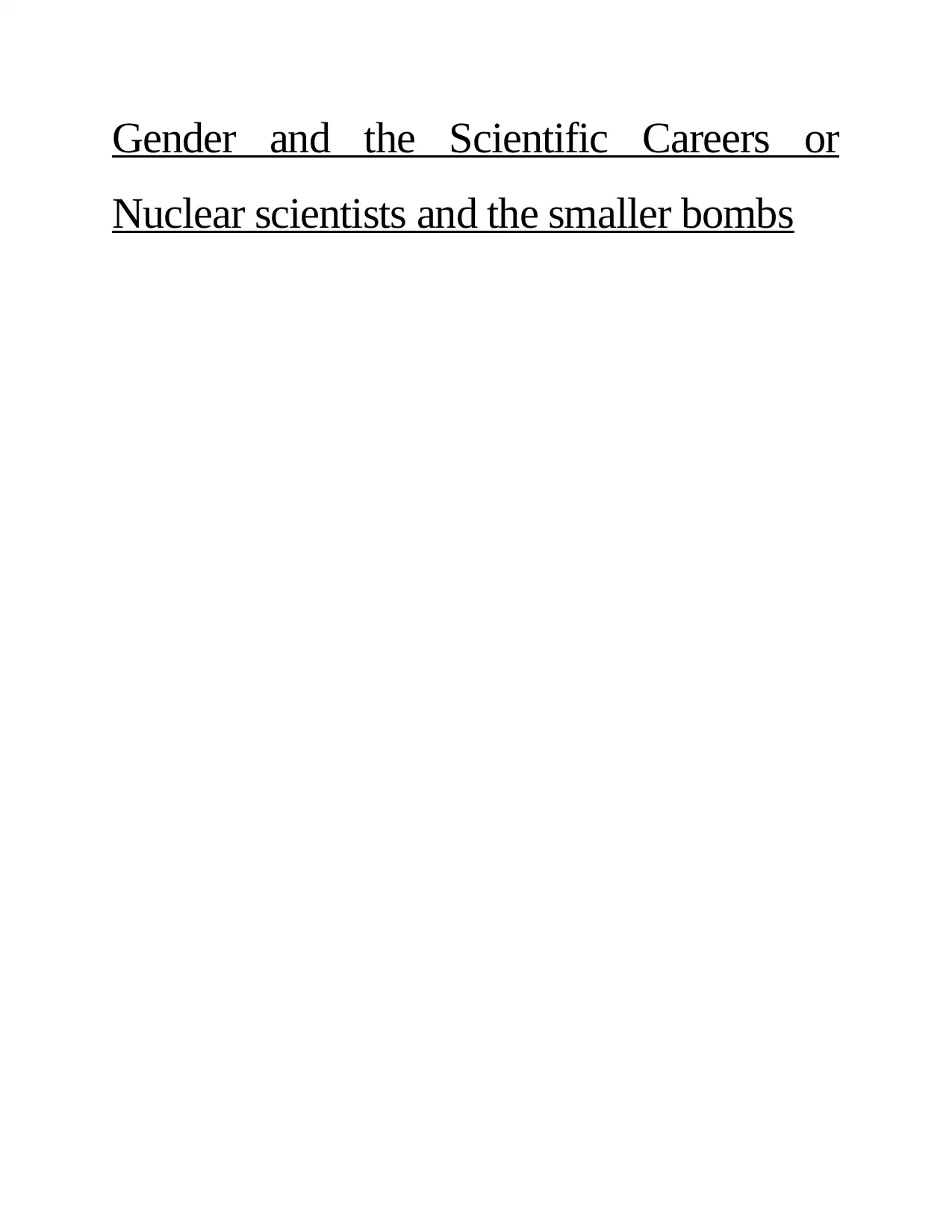
Gender and the Scientific Careers or
Nuclear scientists and the smaller bombs
Nuclear scientists and the smaller bombs
Paraphrase This Document
Need a fresh take? Get an instant paraphrase of this document with our AI Paraphraser
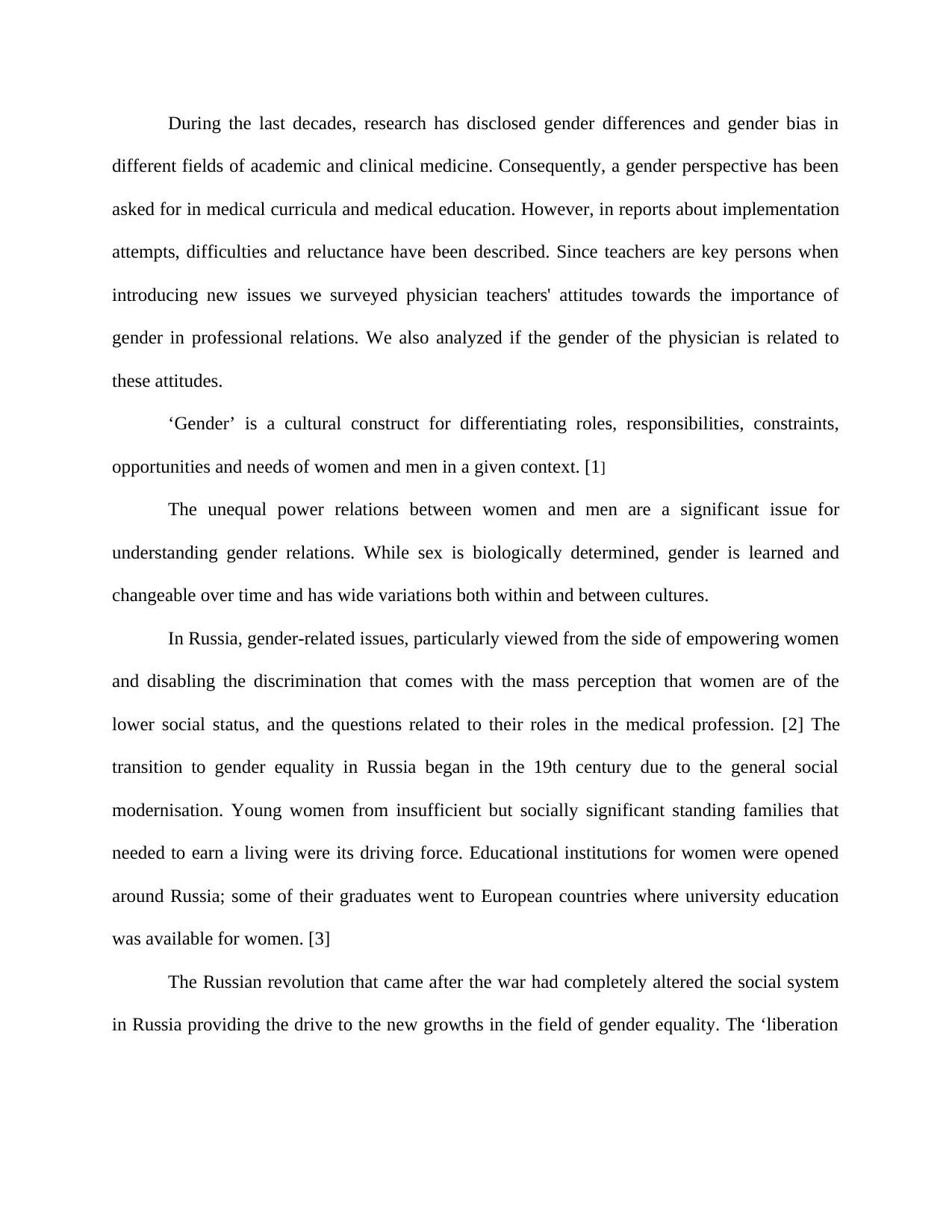
During the last decades, research has disclosed gender differences and gender bias in
different fields of academic and clinical medicine. Consequently, a gender perspective has been
asked for in medical curricula and medical education. However, in reports about implementation
attempts, difficulties and reluctance have been described. Since teachers are key persons when
introducing new issues we surveyed physician teachers' attitudes towards the importance of
gender in professional relations. We also analyzed if the gender of the physician is related to
these attitudes.
‘Gender’ is a cultural construct for differentiating roles, responsibilities, constraints,
opportunities and needs of women and men in a given context. [1]
The unequal power relations between women and men are a significant issue for
understanding gender relations. While sex is biologically determined, gender is learned and
changeable over time and has wide variations both within and between cultures.
In Russia, gender-related issues, particularly viewed from the side of empowering women
and disabling the discrimination that comes with the mass perception that women are of the
lower social status, and the questions related to their roles in the medical profession. [2] The
transition to gender equality in Russia began in the 19th century due to the general social
modernisation. Young women from insufficient but socially significant standing families that
needed to earn a living were its driving force. Educational institutions for women were opened
around Russia; some of their graduates went to European countries where university education
was available for women. [3]
The Russian revolution that came after the war had completely altered the social system
in Russia providing the drive to the new growths in the field of gender equality. The ‘liberation
different fields of academic and clinical medicine. Consequently, a gender perspective has been
asked for in medical curricula and medical education. However, in reports about implementation
attempts, difficulties and reluctance have been described. Since teachers are key persons when
introducing new issues we surveyed physician teachers' attitudes towards the importance of
gender in professional relations. We also analyzed if the gender of the physician is related to
these attitudes.
‘Gender’ is a cultural construct for differentiating roles, responsibilities, constraints,
opportunities and needs of women and men in a given context. [1]
The unequal power relations between women and men are a significant issue for
understanding gender relations. While sex is biologically determined, gender is learned and
changeable over time and has wide variations both within and between cultures.
In Russia, gender-related issues, particularly viewed from the side of empowering women
and disabling the discrimination that comes with the mass perception that women are of the
lower social status, and the questions related to their roles in the medical profession. [2] The
transition to gender equality in Russia began in the 19th century due to the general social
modernisation. Young women from insufficient but socially significant standing families that
needed to earn a living were its driving force. Educational institutions for women were opened
around Russia; some of their graduates went to European countries where university education
was available for women. [3]
The Russian revolution that came after the war had completely altered the social system
in Russia providing the drive to the new growths in the field of gender equality. The ‘liberation
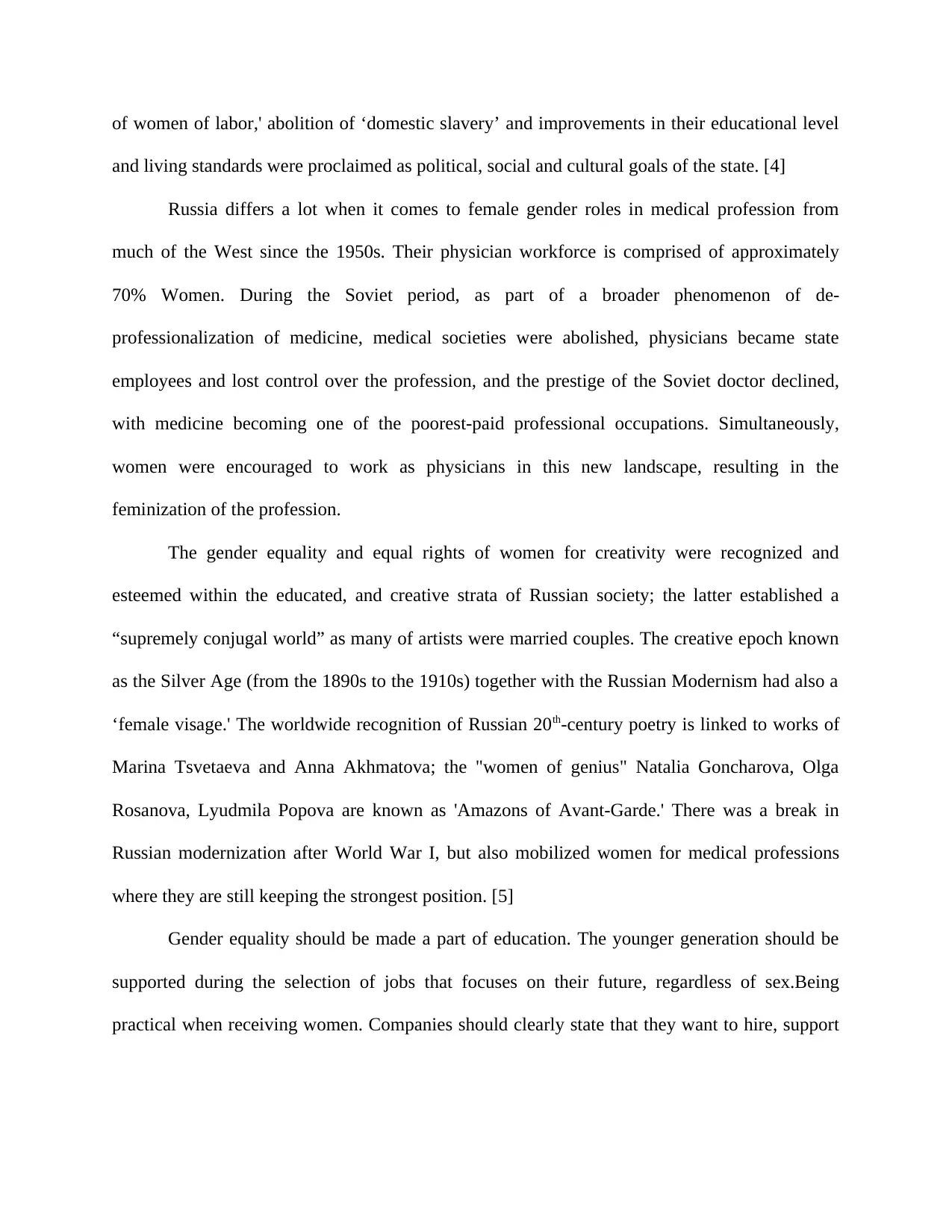
of women of labor,' abolition of ‘domestic slavery’ and improvements in their educational level
and living standards were proclaimed as political, social and cultural goals of the state. [4]
Russia differs a lot when it comes to female gender roles in medical profession from
much of the West since the 1950s. Their physician workforce is comprised of approximately
70% Women. During the Soviet period, as part of a broader phenomenon of de-
professionalization of medicine, medical societies were abolished, physicians became state
employees and lost control over the profession, and the prestige of the Soviet doctor declined,
with medicine becoming one of the poorest-paid professional occupations. Simultaneously,
women were encouraged to work as physicians in this new landscape, resulting in the
feminization of the profession.
The gender equality and equal rights of women for creativity were recognized and
esteemed within the educated, and creative strata of Russian society; the latter established a
“supremely conjugal world” as many of artists were married couples. The creative epoch known
as the Silver Age (from the 1890s to the 1910s) together with the Russian Modernism had also a
‘female visage.' The worldwide recognition of Russian 20th-century poetry is linked to works of
Marina Tsvetaeva and Anna Akhmatova; the "women of genius" Natalia Goncharova, Olga
Rosanova, Lyudmila Popova are known as 'Amazons of Avant-Garde.' There was a break in
Russian modernization after World War I, but also mobilized women for medical professions
where they are still keeping the strongest position. [5]
Gender equality should be made a part of education. The younger generation should be
supported during the selection of jobs that focuses on their future, regardless of sex.Being
practical when receiving women. Companies should clearly state that they want to hire, support
and living standards were proclaimed as political, social and cultural goals of the state. [4]
Russia differs a lot when it comes to female gender roles in medical profession from
much of the West since the 1950s. Their physician workforce is comprised of approximately
70% Women. During the Soviet period, as part of a broader phenomenon of de-
professionalization of medicine, medical societies were abolished, physicians became state
employees and lost control over the profession, and the prestige of the Soviet doctor declined,
with medicine becoming one of the poorest-paid professional occupations. Simultaneously,
women were encouraged to work as physicians in this new landscape, resulting in the
feminization of the profession.
The gender equality and equal rights of women for creativity were recognized and
esteemed within the educated, and creative strata of Russian society; the latter established a
“supremely conjugal world” as many of artists were married couples. The creative epoch known
as the Silver Age (from the 1890s to the 1910s) together with the Russian Modernism had also a
‘female visage.' The worldwide recognition of Russian 20th-century poetry is linked to works of
Marina Tsvetaeva and Anna Akhmatova; the "women of genius" Natalia Goncharova, Olga
Rosanova, Lyudmila Popova are known as 'Amazons of Avant-Garde.' There was a break in
Russian modernization after World War I, but also mobilized women for medical professions
where they are still keeping the strongest position. [5]
Gender equality should be made a part of education. The younger generation should be
supported during the selection of jobs that focuses on their future, regardless of sex.Being
practical when receiving women. Companies should clearly state that they want to hire, support
⊘ This is a preview!⊘
Do you want full access?
Subscribe today to unlock all pages.

Trusted by 1+ million students worldwide
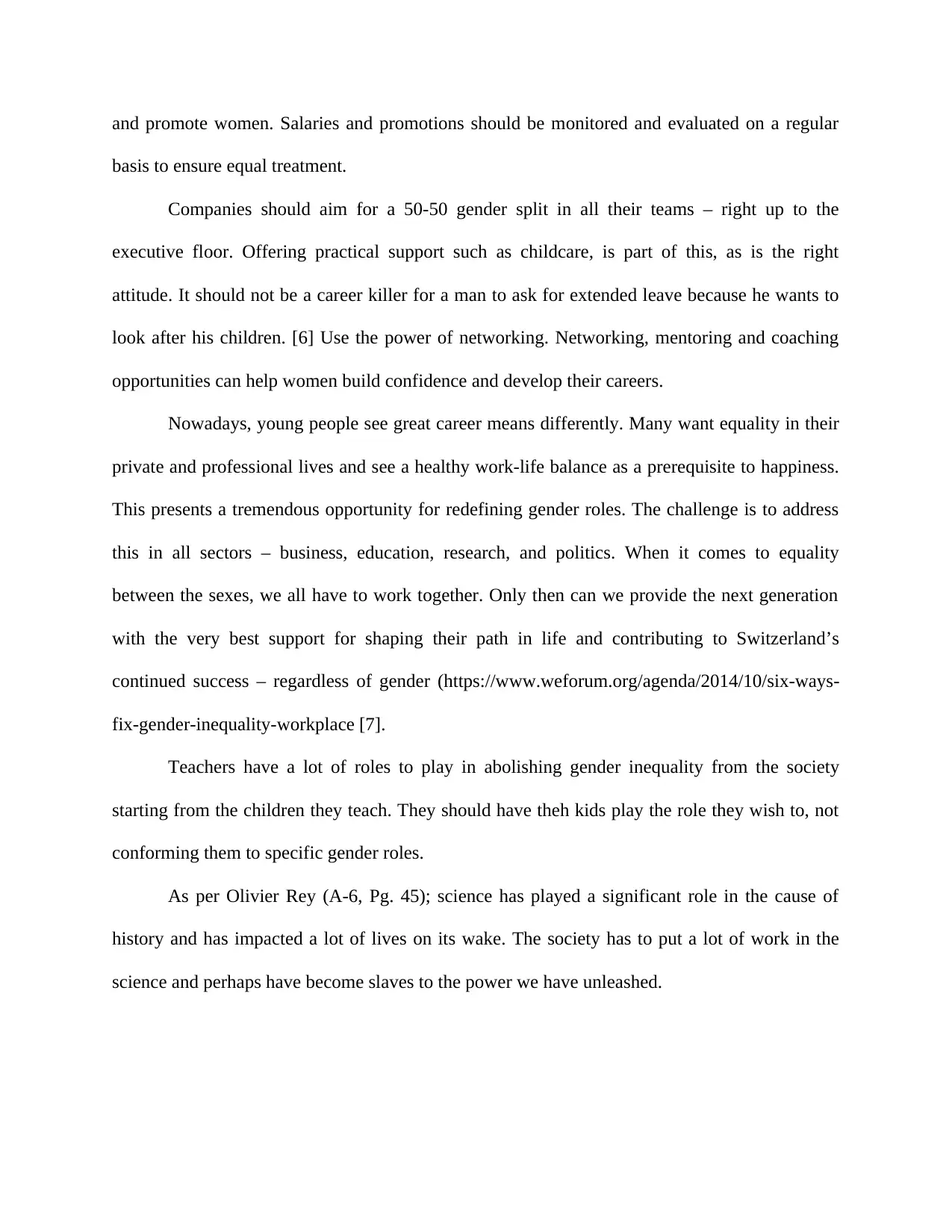
and promote women. Salaries and promotions should be monitored and evaluated on a regular
basis to ensure equal treatment.
Companies should aim for a 50-50 gender split in all their teams – right up to the
executive floor. Offering practical support such as childcare, is part of this, as is the right
attitude. It should not be a career killer for a man to ask for extended leave because he wants to
look after his children. [6] Use the power of networking. Networking, mentoring and coaching
opportunities can help women build confidence and develop their careers.
Nowadays, young people see great career means differently. Many want equality in their
private and professional lives and see a healthy work-life balance as a prerequisite to happiness.
This presents a tremendous opportunity for redefining gender roles. The challenge is to address
this in all sectors – business, education, research, and politics. When it comes to equality
between the sexes, we all have to work together. Only then can we provide the next generation
with the very best support for shaping their path in life and contributing to Switzerland’s
continued success – regardless of gender (https://www.weforum.org/agenda/2014/10/six-ways-
fix-gender-inequality-workplace [7].
Teachers have a lot of roles to play in abolishing gender inequality from the society
starting from the children they teach. They should have theh kids play the role they wish to, not
conforming them to specific gender roles.
As per Olivier Rey (A-6, Pg. 45); science has played a significant role in the cause of
history and has impacted a lot of lives on its wake. The society has to put a lot of work in the
science and perhaps have become slaves to the power we have unleashed.
basis to ensure equal treatment.
Companies should aim for a 50-50 gender split in all their teams – right up to the
executive floor. Offering practical support such as childcare, is part of this, as is the right
attitude. It should not be a career killer for a man to ask for extended leave because he wants to
look after his children. [6] Use the power of networking. Networking, mentoring and coaching
opportunities can help women build confidence and develop their careers.
Nowadays, young people see great career means differently. Many want equality in their
private and professional lives and see a healthy work-life balance as a prerequisite to happiness.
This presents a tremendous opportunity for redefining gender roles. The challenge is to address
this in all sectors – business, education, research, and politics. When it comes to equality
between the sexes, we all have to work together. Only then can we provide the next generation
with the very best support for shaping their path in life and contributing to Switzerland’s
continued success – regardless of gender (https://www.weforum.org/agenda/2014/10/six-ways-
fix-gender-inequality-workplace [7].
Teachers have a lot of roles to play in abolishing gender inequality from the society
starting from the children they teach. They should have theh kids play the role they wish to, not
conforming them to specific gender roles.
As per Olivier Rey (A-6, Pg. 45); science has played a significant role in the cause of
history and has impacted a lot of lives on its wake. The society has to put a lot of work in the
science and perhaps have become slaves to the power we have unleashed.
Paraphrase This Document
Need a fresh take? Get an instant paraphrase of this document with our AI Paraphraser
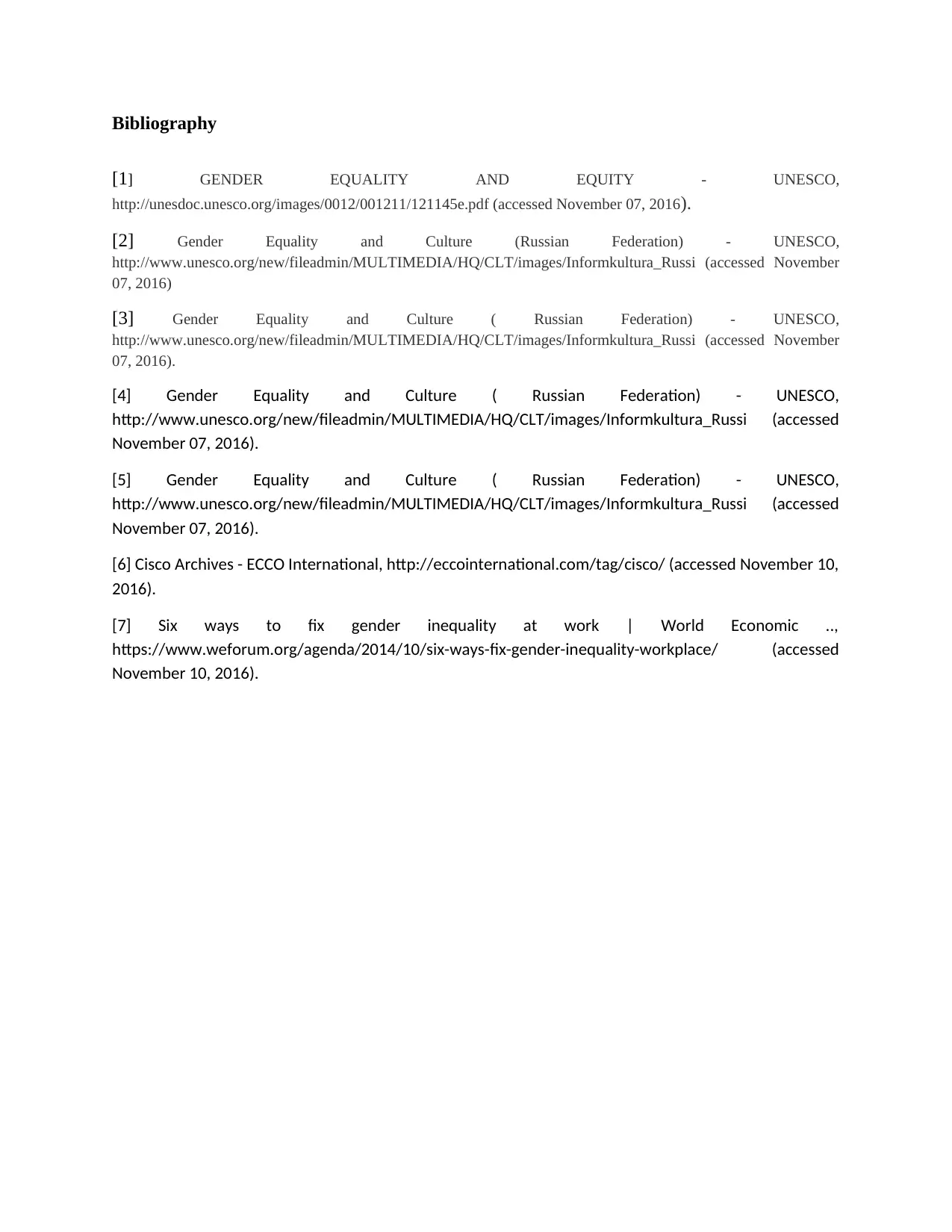
Bibliography
[1] GENDER EQUALITY AND EQUITY - UNESCO,
http://unesdoc.unesco.org/images/0012/001211/121145e.pdf (accessed November 07, 2016).
[2] Gender Equality and Culture (Russian Federation) - UNESCO,
http://www.unesco.org/new/fileadmin/MULTIMEDIA/HQ/CLT/images/Informkultura_Russi (accessed November
07, 2016)
[3] Gender Equality and Culture ( Russian Federation) - UNESCO,
http://www.unesco.org/new/fileadmin/MULTIMEDIA/HQ/CLT/images/Informkultura_Russi (accessed November
07, 2016).
[4] Gender Equality and Culture ( Russian Federation) - UNESCO,
http://www.unesco.org/new/fileadmin/MULTIMEDIA/HQ/CLT/images/Informkultura_Russi (accessed
November 07, 2016).
[5] Gender Equality and Culture ( Russian Federation) - UNESCO,
http://www.unesco.org/new/fileadmin/MULTIMEDIA/HQ/CLT/images/Informkultura_Russi (accessed
November 07, 2016).
[6] Cisco Archives - ECCO International, http://eccointernational.com/tag/cisco/ (accessed November 10,
2016).
[7] Six ways to fix gender inequality at work | World Economic ..,
https://www.weforum.org/agenda/2014/10/six-ways-fix-gender-inequality-workplace/ (accessed
November 10, 2016).
[1] GENDER EQUALITY AND EQUITY - UNESCO,
http://unesdoc.unesco.org/images/0012/001211/121145e.pdf (accessed November 07, 2016).
[2] Gender Equality and Culture (Russian Federation) - UNESCO,
http://www.unesco.org/new/fileadmin/MULTIMEDIA/HQ/CLT/images/Informkultura_Russi (accessed November
07, 2016)
[3] Gender Equality and Culture ( Russian Federation) - UNESCO,
http://www.unesco.org/new/fileadmin/MULTIMEDIA/HQ/CLT/images/Informkultura_Russi (accessed November
07, 2016).
[4] Gender Equality and Culture ( Russian Federation) - UNESCO,
http://www.unesco.org/new/fileadmin/MULTIMEDIA/HQ/CLT/images/Informkultura_Russi (accessed
November 07, 2016).
[5] Gender Equality and Culture ( Russian Federation) - UNESCO,
http://www.unesco.org/new/fileadmin/MULTIMEDIA/HQ/CLT/images/Informkultura_Russi (accessed
November 07, 2016).
[6] Cisco Archives - ECCO International, http://eccointernational.com/tag/cisco/ (accessed November 10,
2016).
[7] Six ways to fix gender inequality at work | World Economic ..,
https://www.weforum.org/agenda/2014/10/six-ways-fix-gender-inequality-workplace/ (accessed
November 10, 2016).
1 out of 5
Related Documents
Your All-in-One AI-Powered Toolkit for Academic Success.
+13062052269
info@desklib.com
Available 24*7 on WhatsApp / Email
![[object Object]](/_next/static/media/star-bottom.7253800d.svg)
Unlock your academic potential
Copyright © 2020–2026 A2Z Services. All Rights Reserved. Developed and managed by ZUCOL.





